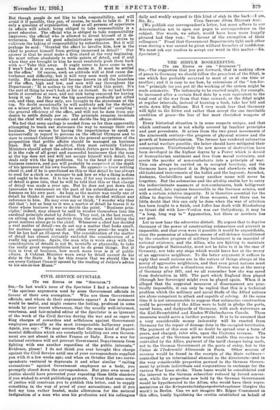THE SIBYL'S BOOKKEEPING.
(To THZ Faeroe or sax " Specreroa."1 Sra,—The suggestion that you put forward, that in making offers of peace to Germany we should follow the precedent of the Sibyl, is one which has probably occurred to most of us at one time or another; and it is easy to see how, by extensions of the " ton-for- ton " principle (as you put it) the working of the system might be made automatic. The indemnity to be exacted might, for example, be increased after a certain fixed date by a sum equivalent to the total cost of the war from that time onward; or the Sibyl might at regular intervals, instead of burning a book, take her bill and write down fifty millions. But I very much fear that Germany will fight to the bitter end rather than accept the one inevitable condition of peace—the loss of her most cherished weapons of offence.
Every historical situation is in some respects unique, and that which confronts us is not wholly covered by familiar principles and past precedents. It arises from the two great movements of the nineteenth century—the progress of physical science and the growth of humanitarianism. The former has rendered submarine and aerial warfare possible; the latter should have mitigated their consequences. Unfortunately the new means of destruction have been developed in the highest degree by a Power which is devoid of humanitarian sentiment and free from moral restraints, and erects the murder of non-combatants into a principle of war. This can always be carried on in occupied territory, and the Germans have practised it in Belgium and elsewhere with the old-fashioned instruments of the bullet and the bayonet; Aerschot, Andenne, GerleSvillers and many another name will never be forgotten. But the submarine and the airship enable her to carry the indiscriminate massacre of non-combatants, both belligerent and neutral, into regions inaccessible to the German armies, and with a certain relative impunity. It is therefore essential for the Allies to deprive Germany of these weapons, and there can be little doubt that this can only be done when the war of attrition has been fought to a finish, and Joffre has dealt with Hindenburg as Grant did with Lee—Verdun was our Gettysburg; it may be "a long, long way to" Appomattox, but there or nowhere lies our goal.
Let us now hear the adcocatus diaboli. He argues that to deprive Germany of the power of constructing submarines and aircraft is impossible, and that even were it possible it would be unjustifiable, since the possession of adequate means of self-defence (conditioned by the ceaseless progress of military technique) is an essential of national existence, and the Allies, who are fighting to maintain the principle of Nationality, must not be false to it in the case of Germany, nor take any steps which would leave her at the mercy of an aggressive neighbour. To the latter argument it suffices to reply that small nations are in the nature of things always at the mercy of aggressive neighbours, and that even great nations must inevitably be so after a disastrous war. France was at the mercy of Germany after 1871, and we all remember how she was saved from destruction in 1875. The part which England then played (through her Sovereign) might even be played again. When it is alleged that the suggested measures of disarmament are prac- tically impossible, it can only be replied that this is a technical problem which the military and naval Staffs of the Allied nations are alone competent to attack and capable of solving. At the same time it is not unreasonable to suppose that submarine construction could be prevented if the Allies were to hold in pledge the ports, naval bases, and dockyards of Germany, with such waterways as the Kiel-Brunsbfittel and Emden-Wilhelmshaven Canals. These measures would serve a further purpose. It is to be assumed that a very considerable money indemnity will be exacted from Germany for the repair of damage done in the occupied territories. The payment of this sum will no doubt be spread over a term of years, and charged, inter alia, upon the Customs revenue. The occupation of the German ports would enable this revenue to be controlled by the Allies, payment of the tariff charges being made, not to the German Government at the ports of entry, but to the Caine Sc lindemnite Allemande in Paris. Other sources of revenue would be found in the receipts of the State railways— controlled by an international element in the directorate—And in the very considerable properties pawned to the German Govern- ment by private individuals and corporations in exchange for the various War Loan stocks. These loans would be consolidated and the interest to the German subscriber reduced by forced conver- sion, while the properties now held by the German Government would be hypothecated to the Allies, who would have their repre- sentativee at the Krisgsentscleadigungsdarlehepskane (forgive the word!) in Berlin. Can we not imagine Mr. Edgar Crammond in this office, busily liquidating the credits established on behalf of the Caisse de l'Indemnite in such a manner as to secure the outflow of the mineral wealth of the basins of the Saar and Ruhr in satisfaction of the demands which M. Yves Guyot very properly makes on behalf of French manufacturing industry, without sacrifice of the Free Trade principles which that veteran economist holds so dear? May we not picture Mr. Hartley Withers in Paris, deftly lubricating the delicate machinery of the international exchanges so as to take the needful toll of the produce of the New World on its road to Germany, whilst in that country Friedrich Naumann exercises his acrobatic adaptability in a new phase of Weltwirthschaft, and constructs some neat and handy economic shelter out of the wreckage of Mitteleuropa 1 You suggest that the Sibyl should address a personal warning to the head of the House of Hohenzollern. Here it may perhaps be permissible to differ from you. Certainly I hold no brief for the Kaiser; but is it not better to treat him merely as repre- senting the histrionic element in the German character (so oddly suited with its Bealismus) and to refrain from setting the stage for his last pose while there is more pressing work to be done? Doubtless both the Hohenzollern and the Hapsburg will in due time go the way of the Bourbon and the Bonaparte; but it is much to be desired that this should in each case be brought about by the act of a self-determining nation, and not through foreign



































 Previous page
Previous page